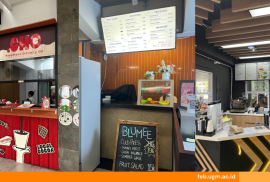The Accounting Laboratory, Accounting Department, Faculty of Economics and Business (FEB) UGM together with the Master of Science and Doctoral Study Program (MD) FEB UGM held a Webinar Series with the theme “Philosophy and Approaches to Accounting and Business Research”. The introduction and understanding of the philosophy and research approaches that are important for researchers in conducting research are the essence of the series. This Webinar series consists of 7 series of discussion sessions with 7 different topics in each session which has been carried out starting from April 9, 2021. On Friday (4/06) the last series of this Webinar Series was successfully held by bringing the topic of critical realism paradigms to discussion.
In the last session that concluded this webinar series, Vogy Gautama Buanaputra, M.Sc., Ph.D., AFHEA., was present again to be a speaker after having also been a speaker in the first series. Vogy started the material discussion session by reviewing the paradigms that had been explained in the previous sessions. This was done because the critical realism paradigm is still related to the previous paradigms. “My suggestion is that the deepening of critical realism really requires an understanding of other paradigms,” said Vogy.
The critical realism paradigm was first echoed by a philosopher from England, Roy Bhaskar, and was present as an alternative “war” between the mainstream paradigm represented by positivism and non-mainstream which tended to be represented by post-structuralism. According to this paradigm, a reality exists independently of social agents and there is an element of objectivism. This point resembles the reality that the positivism paradigm believes in. Meanwhile, the epistemology of the critical paradigm states that human behavior is the result of (real) generative mechanisms. The generative mechanism of its existence has preceded human interaction and this epistemology includes elements of the post-structuralist paradigm.
In addition, the ontology of critical realism is stratified, consisting of 3 levels, namely real (generative mechanism), actual (events), and empirical (observable). At the real level, it can have an effect that culminates in an event at the second level (actual) and then we can feel it at the third level (empirical). Vogy also discussed the consequences of the critical realism paradigm on the research approach. According to him, critical realism is open to various methodologies due to the relativism element in understanding a reality as long as it is with one goal which is related to generative mechanisms.
Furthermore, in this paradigm, we recognize the so-called structure and agent. Vogy explains the dualism of analysis, which is a separate analysis between structure and agent. The object of social science is relational and there are relations that are substantial and formal. Substantial relations consist of internal relations and external relations. These internal relations are called social structures and the agent’s role occupies positions in the structure. Positions provide agents with incentives or interests to act conditioned by social structures.
Several studies using the critical realism paradigm are also described by Vogy in this discussion, including research by Ackroyd and Fleetwood in 2000. This research tries to explore the causal structure that underlies organizational and professional activities, such as shareholder interests. In addition, there is also a study by Ahmed and Uddin in 2018 which investigated the generative mechanisms and conditioning the practice of corporate governance in a company in Bangladesh. At the end of the event, the moderator concluded that this critical realism approach or paradigm is actually aimed at helping researchers explore and identify things that cannot be seen with the naked eye.
Reportage: Kirana Lalita Pristy/Sony Budiarso.




